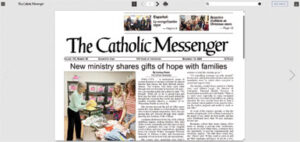By Fr .Thom Hennen
Question Box
Q: With the Pope being very ill and at some point possibly becoming incapacitated and unable to carry out his duties, what happens to the leadership of the Catholic Church?
A:This is something on the minds of many Catholics. As we continue to pray for the health of Pope Francis, we also need to prepare ourselves for the day when he will no longer be our pope.
He may yet choose, as did his predecessor, Pope Benedict XVI, to resign. If not, at some point he will die, as we all must. The difference today from earlier eras of the Church is that people generally live longer and with relatively good quality of life and yet may be unable to function with the same mental acuity. This would certainly pose a problem for a pope, entrusted with the governance of the Church.
Apparently, in 2022, Pope Francis verified the existence of a letter he wrote shortly after his election as pope outlining the terms of his resignation, should he become incapacitated. However, the letter’s contents are unknown and some questions exist about its canonical validity.
Dioceses can be “impeded,” meaning that the bishop is no longer able to serve as bishop. Certain protocols for a diocese’s governance then come into effect until a new bishop is appointed. Canon law does not spell out anything so specific for the Holy See. Normally, this transition of power happens only when a pope dies or resigns. Canon 335 states: “When the Roman See is vacant or entirely impeded, nothing is to be altered in the governance of the universal Church; the special laws issued for these circumstances, are to be observed.”
At this point, given the daily updates we are receiving, it does not appear that the Roman See is “entirely impeded.” Reports state that the pope is aware, alert and on good days able to engage in some limited work. We have had more detailed reports about Pope Francis during his hospitalization than was typical in the past or, for that matter, than any of us might be comfortable with were we in a similar situation. As much as some people like to believe that the Vatican is a “secret” organization, Vatican officials have been remarkably transparent during the pope’s illness.
I would also point out that this isn’t our “first rodeo.” We have had ill and at least partially incapacitated popes in the past. The Church does not come to a grinding halt when this happens. The structure, processes and delegation within the various dicasteries of the Vatican keep things running, apart from those things (such as the appointment of new bishops), which only the pope can do.
I was blessed to study in Rome during the last years of Pope John Paul II. It was difficult to see him so visibly struggling as he battled not only the effects of aging but also Parkinson’s disease. At the same time, in his infirmity, he preached profoundly with his own body the dignity of the human person at every stage of life. A person is a person no matter how old or how sick.
When Pope John Paul II died, I felt both a palpable sense that we were without our head and a sense of deep gratitude for his service to the Church and a hopeful confidence that the Church would go on. The Church is much bigger than the pope or any of his predecessors back to St. Peter himself. The Church is the living, breathing, Body of Christ, animated by the Holy Spirit. I trust I will have similar feelings when Pope Francis passes.
In the past two conclaves, I found myself frustrated by coverage in the secular press. They present the election of the pope as a purely political process. This was also my main beef with the recent film Conclave. In it, we receive a picture of the Church minus the Holy Spirit. We forget that the pope is not simply the “head of an organization,” but a father (that’s what “pope” means), and that he and the men who will select his successor are men of faith, disciples of Jesus Christ.
(Father Thom Hennen serves as the pastor of Sacred Heart Cathedral in Davenport and vicar general for the Diocese of Davenport. Send questions to messenger@davenportdiocese.org)










